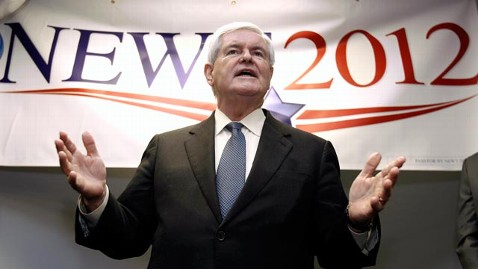Newt Gingrich Had Lucrative Health Industry Ties

Winslow Townson/AP Photo
As Newt Gingrich attempts to shrug off his political baggage, the former House speaker is under new scrutiny for having close ties to health care giants and flip-flopping on his statements on health care.
The Center for Health Transformation, which Gingrich founded, raked in millions of dollars from heavy hitters like GE Healthcare and Wellpoint, as first reported by the Washington Post. The group says it does not lobby, but on its website, it touts its ability to build bridges between the federal government and private sector. Among its strengths, the think tank lists its unparalleled “network of allies” in the federal government, states, corporations and hospitals; “coalition building capabilities,” and “media visibility.”
Gingrich no longer owns the company and left when he decided to run for president. But his work with the group shows that the former congressman from Georgia has yet to overcome the challenge of reconciling his two roles of businessman and politician.
He has blasted the individual mandate in the Affordable Care Act, saying in a video that he is “completely opposed to the Obamacare mandate on individuals,” and that he “fought it for two and half years at the Center for Health Transformation.” But the group, which Gingrich founded, actually supported imposing a mandate on those who made more than $50,000 per year.
CHT spokeswoman Susan Meyers said the group advocates such a move at the state level, not solutions that are “forced at the federal level” and that Gingrich supports “free market solutions.”
“We believe that any idea that states want to originate, that’s fine,” Meyers told ABC News. “It should be their prerogative if they choose to do that.”
Still, Gingrich hasn’t made that clear. In fact, he criticized opponent Mitt Romney for implementing such a “bureaucratic” mandate in Massachusetts.
CHT also advocates centralizing electronic medical records, a key component of President Obama’s Affordable Care Act, which the organization has denounced.
“We believe in that for patient safety because too many medical errors occur when paper records are used,” Meyers said when asked about the contradiction. “That’s something Newt advocated years ago, long before President Obama.”
Gingrich also broke from the right when he praised his client Gundersen Lutheran Health System‘s end-of-life best practice as one that “empowers patients and families.” At the height of the health care debate in which end-of-life care became a key dividing issue between Republicans and Democrats, Gingrich stood out alone in the Republican field.
Gingrich’s campaign has said the firm brings in revenue of $5 million a year, a figure Meyers would not confirm.
Gingrich’s other businesses are also under the spotlight. Through Gingrich Group, the former House speaker consulted for reportedly $1.8 million for eight years for Freddie Mac, the federally-backed mortgage giant that most conservatives say should be eliminated. While Gingrich has denied lobbying for them, he hasn’t provided a viable explanation of what kind of services he provided to an organization that he himself recently said should be abolished. In 2008, he demanded that President Obama and other members of Congress return the money they received from them, and more recently said Democrats like Rep. Barney Frank should be jailed for having ties with lobbyists at those organizations.
The connections with Washington insiders and multi-million dollar corporations makes it hard for Gingrich to cast himself as an outsider and clouds his “new Newt” campaign, experts say.
“Even if there’s no ethical or legal impropriety, the optics are bad,” said John Pitney Jr., politics professor at Claremont McKenna College who worked for Gingrich. But “for Newt, it’s not at all surprising. He had to deal with ethics questions throughout his tenure as speaker. … The idea that questions are emerging about ethics is very unsurprising.”
As he rises in the polls, Gingrich’s inconsistencies are increasingly coming under the spotlight.
In 1989, Gingrich co-sponsored the Global Warming Prevention Act and in 2008 appeared with then-House speaker Nancy Pelosi to warn about global warming. Now he says he doesn’t know whether climate change is really occurring and called that ad “the dumbest single thing” he’s done in recent years.
Gingrich also once advocated imposed mandatory limits on carbon dioxide emissions, but has recently become a vocal critic of the cap-and-trade bills.
He has also flip-flopped on Libya, first criticizing President Obama for intervening and then saying later he would have sent forces there.
It remains to be seen whether Gingrich can overcome these hurdles but the results of this scrutiny could be damaging, experts say.
“A lot of people watching the debates saw him as a fresh face. These stories remind people that he’s been on the shelf for a very long time,” Pitney said. “He has to show a level of discipline that he has not previously shown. Maybe he can pull it off… But if you’re making an estimate on the basis of history, it would be a very long shot indeed.”